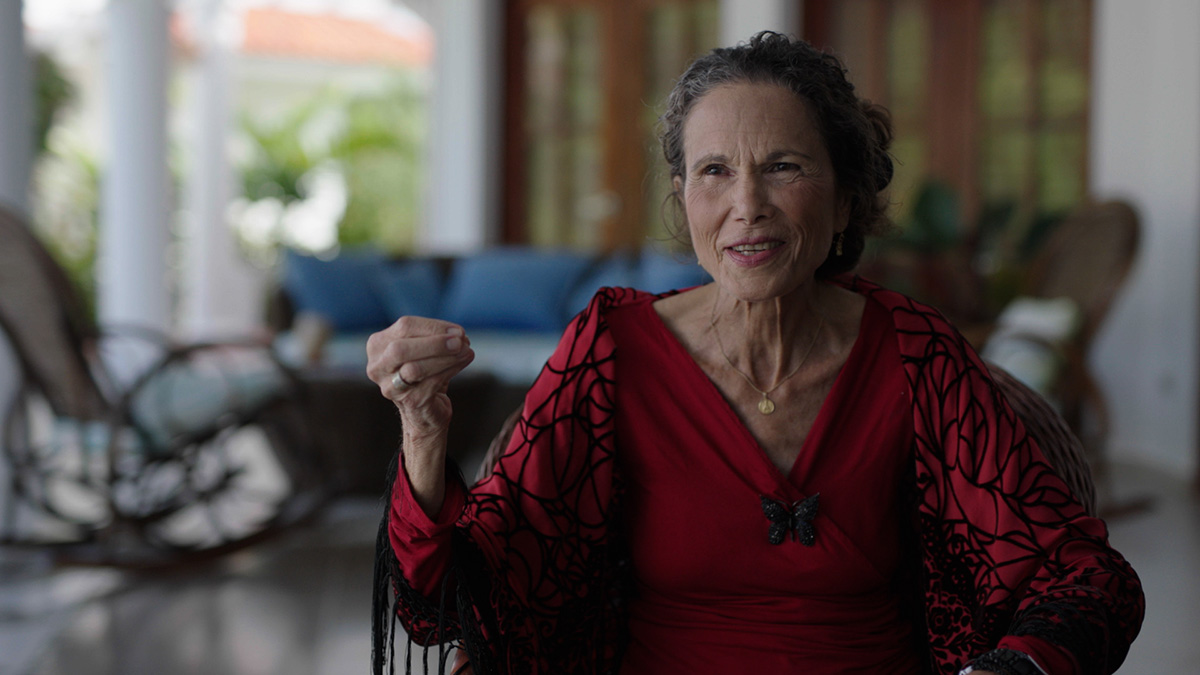“It’s very hard for a writer to cede the narrative to someone else, especially when they’re going to make you the protagonist,” renowned author Julia Alvarez tells Latina Media Co when asked about participating in PBS’s new documentary about her life.
Julia Alvarez: A Life Reimagined premieres September 17 and follows Alvarez from her childhood in the Dominican Republic to today. Directed by Cuban filmmaker Adriana Bosch, it explores young Julia’s feeling about immigrating, her experience as a first-gen teen, her early years as a nomad writer trying to break in, and eventually, her process creating such beloved works as How the García Girls Lost Their Accents and In the Time of the Butterflies. Oh, and there’s personal stuff too, her relationship with her family, her charitable work, and her marriages.
“At the beginning, I was just cringing, saying ‘I shouldn’t have said that. I should have said that better.’ I was revising as if it were a novel,” Alvarez shares of watching the documentary. By the end, though, she thought to herself, “Woman, you have lived a life.”
In our chat, Alvarez is smart, earnest, and funny, quoting others to contextualize her insights. For example, she recounts going to a preview screening of the doc in her hometown. The house was packed and she remembers looking around and thinking, “Maybe this wasn’t such a great idea, because I can’t leave town afterwards.”
Her neighbors gave her a standing ovation and the experience made her more grateful for everyone who helped her along the way, something the film shows and celebrates. Alvarez explains her reaction with an Indigenous proverb about a woman who, “even as a young girl, she’s reaching, reaching, reaching for the stars, never quite getting there. And finally, as an old, old woman, she touches her star. Father Sky looks down and says, ‘How did you get to be so tall?’ She says, ‘I’m standing on a lot of shoulders.’ That’s what I felt. I’m standing on a lot of shoulders, and I saw them displayed before me.”
It’s a beautiful sentiment from a woman who’s full of them.
“There’s no around, there’s only through,” Alvarez says when asked to share some words of wisdom, “My mistakes were up on the screen in the documentary. My path was by the seat of my pants, trial and error.” Still, there’s one bit of advice she feels confident in passing along, “Hold on to that passion, the thing that gives you light and life and energy and ánimo, that lights you up. Don’t let anybody tell you it’s not for you.”
Alvarez hasn’t. At seventy-four, she’s still publishing, still challenging herself. With her last two books, The Cementary of Untold Stories (2024) and Afterlife (2021), she asks, “What if instead of the portrait of the artist as a young man, [it’s] the portrait of the artist as an old Latina woman at that stage of her career?”
With these later works, she’s moving abuelitas to the forefront and leaning into her status as an elder. “I can also be grateful to my culture. I come from a culture where we were raised that our viejitos were super important, that we should show respect, and that they were a font of stories,” she shares. “In a good way, it’s given me models that don’t make me afraid of aging.” In fact, she credits her seven-plus decades as giving her a 360-degree view of life, “I have hindsight, I have foresight, and I have insight,” she says, dropping another quote.
Not that the road was easy. Remember Alvarez didn’t publish her first novel until she was 41. Before that, it was a long list of rejections from publishers who didn’t see the Latinx experience as a worthy subject of American literature. When How the García Girls Lost Their Accents did come out, Alvarez remembers, “I got a review in the New York Times. And the last line was so crushing, it said, ‘Julia Alvarez has not yet found her voice.’ And… I don’t want to profile anybody by their ethnicity or color or race or whatever, but a white woman was looking at it and telling me that I hadn’t found my voice. I felt like saying, ‘You haven’t learned to listen to other voices!’” Or that’s what the “gutsy” part of her wants to say now. At the time, she was crushed, remembering how hard it was not to take that criticism to heart.
In Julia Alvarez: A Life Reimagined, that dynamism is on full display. Here’s a brave woman with a slew of accomplishments under her belt who’s as comfortable fighting for her community as she is acknowledging her own weaknesses.
“I remember when I had to fight at Middlebury College, this was 1988, to get the college to accept in the curriculum a course that I wanted to teach Latino/Latina literature and film,” she recalls. “They said, ‘Well, it doesn’t really belong in the Spanish department, and it doesn’t belong in the English department with Shakespeare and Chaucer Milton. Where will we put this?’” Long story short, it’s now part of the curriculum, thanks to Julia Alvarez.
She’s a legend for a reason. The documentary features Dasha Polanco and Benjamin Bratt reading her novels aloud. In terms of talking heads, there’s Elizabeth Acevedo saying Alvarez goes on the Mt Rushmore of Latina authors (along with Sandra Cisneros and Isabel Allende). The whole community comes out to celebrate Alvarez, who keeps doing the work to pay her good fortune forward.
“A lot of times people look at me and say, ‘Well, what are you complaining about?’ Because they think it’s just about me. And I have to say, ‘no, no, no, no,’” the author recounts of her conversations about the underrepresentation of Latinas in storytelling fields. Thankfully, PBS made this documentary that is all about Alvarez. It airs September 17.

